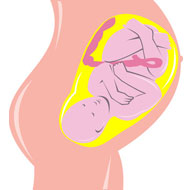- General Articles
- General Pregnancy Questions
- Baby Growth
- Pregnancy Diet
- Miscarriage
- During Pregnancy
- Twin Pregnancy
- Toddler Meals
- Home Remedies During Pregnancy
- Breastfeeding
- Pregnancy Week By Week
- Pregnancy Tests
- Ectopic Pregnancy
- Pregnancy Signs and Symptoms
- Pregnancy Stages
- Potty Training
- Fetal Development
- Preschooler
- Postpartum Depression
- Toddler Illness
- Baby Care
- After Pregnancy
- Molar Pregnancy
- During Delivery
- Beauty and Style
- Pregnancy Clothing
- Preconception
- Fertility
Water Birthing Method
Just as the name implies, a water birth is a process where the mother gives birth submerged in a pool of warm water. Whereas water births have recently gained popularity in the US, they have long since been the chosen alternative in several parts of the world.
What Happens During a Water Birth?
Water births can be carried out in a tub, a small pool, or a specially designed birthing pool.
You can choose to have a water birth at home, at a birthing clinic or in a hospital. Once you go into labor, you are placed in a birthing pool. Your progress is monitored using special underwater equipment.
A special Doppler device is used to monitor your baby's heartbeat as well. Anesthesia and medication can be administered via an IV even when you are underwater. You can choose to deliver underwater or come out of the tub to give birth. A trained attendant or midwife will be on hand, if you choose to give birth underwater. She will be responsible for taking the baby out of the water and ensuring that breathing happens normally.
What are the Benefits of Choosing a Water Birth?
While there have been no long-term studies conducted on the benefits of water births, some of the advantages of this alternative method of childbirth are:
- Water provides a more soothing setting for labor and delivery. Women who have had water births report feeling more relaxed and in less pain than women who gave birth on a bed.
- Women who opt for water births are less likely to need anesthesia to manage the pain.
- Water makes the mother feel lighter and provides buoyancy that helps her move into different positions easily and aids the labor process.
- Water reduces the risks of tears to the perineum during labor and decreases the need for stitches or an episiotomy to the area.
- Reports show that a water birth may help reduce the time spent on the first stage of labor.
- Water causes the muscles and tissues of the vagina to become more elastic thus reducing the chances of a difficult and long drawn out labor and delivery.
- Water births are believed to be less traumatic for the baby as the environment created in a birthing pool is similar to the one within the womb.
What are the Risks of a Water Birth?
Just as there have not been any studies to confirm the benefits of water births, there is no conclusive research on the risks of this type of birthing method. While many midwives and experts insist that water births are as safe (if not safer) than traditional bed births, there are some potential risks involved:
- Though babies posses a primitive reflex that prevents them from breathing in unless they are exposed to air, there have been rare cases where babies born underwater have swallowed water and nearly drowned.
- If a baby does breathe under water, it may lead to a condition known as hyponatremia or low sodium in the blood that can cause a number of complications and side effects.
- There have also been rare cases reported where the umbilical cord of the baby has snapped underwater and emergency transfusions were required.
- Hygiene is always a worry when it comes to water births. While birthing pools in hospitals and clinics are better maintained and follow stricter rules when it comes to cleaning and purifying the water, water births conducted at home or with rented pools may carry contaminated water. If the water in the pool is unclean, there is a higher risk of the baby catching an infection during the birthing process.
- There is a slight risk that your baby will pass his first bowel movement while underwater. Special care needs to be taken to ensure that your baby does not then inhale or swallow the meconium from the water.
- The same warm water that reduces pain during labor can be dangerous after birth as it prevents the muscles from contracting and the blood from clotting.
- Delivery of the placenta may also be affected with a water birth.
- It is difficult to assess if there is any loss of blood during delivery, as water tends to dilute the blood.
When Should You Avoid a Water Birth?
You should avoid a water birth if:
- You suffer from other complications during your pregnancy such as preeclampsia or toxemia.
- You have been diagnosed with an infection such as herpes that may pass on to your newborn baby during childbirth.
- You are prone to excessive bleeding.
- You deliver preterm.
- You are having twins or multiple births.
- Your baby is in breech or transverse position.
Before taking the decision of a water birth, speak to your doctor about all the pros and cons associated with the procedure. You should also check with your hospital or clinic whether water births are offered as an alternative. If not, you may have to consider delivering the baby at home or choosing another hospital or birthing facility. It is also important to check with your medical insurance provider if the cost of your water birth will be covered by your policy.
Read more articles from the During Delivery Category.



 7 Must-Haves Before Your Baby Arrives
7 Must-Haves Before Your Baby Arrives Bonding Games for Babies
Bonding Games for Babies DIY Baby Bath Towel Apron
DIY Baby Bath Towel Apron Common Late Pregnancy Fears
Common Late Pregnancy Fears